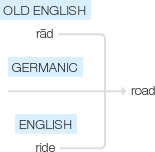Road
Old English rād ‘journey on horseback’, ‘foray’; of Germanic origin; related to the verb ride.
wiktionary
From Middle English rode, rade(“ride, journey”), from Old English rād(“riding, hostile incursion”), from Proto-West Germanic *raidu, from Proto-Germanic *raidō(“a ride”), from Proto-Indo-European *reydʰ-(“to ride”). Doublet of raid, acquired from Scots, and West Frisian reed (paved trail/road, driveway).
The current primary meaning of "street, way for traveling" originated relatively late—Shakespeare seemed to expect his audiences to find it unfamiliar—and probably arose through reinterpetation of roadway as a tautological compound.
etymonline
road (n.)
Middle English rode, from Old English rad "riding expedition, journey, hostile incursion," from Proto-Germanic *raido (source also of Old Frisian red "ride," Old Saxon reda, Middle Dutch rede, Old High German reita "foray, raid"), from PIE *reidh- "to ride" (see ride (v.)). Also related to raid (n.).
In Middle English it was still, "a riding, a journey on horseback; a mounted raid;" the sense of "an open passage or way for traveling between two places" is recorded from 1590s, and the older senses now are obsolete. "The late appearance of this sense makes its development from sense 1 somewhat obscure," according to OED, which however finds similar evolutions in Flemish and Frisian words. The modern spelling was established 18c.
The meaning "narrow stretch of sheltered water near shore where ships can lie at anchor" is from early 14c. (as in Virginia's Hampton Roads). In late 19c. U.S. use it is often short for railroad.
On the road "traveling" is from 1640s. Road test (n.) of a vehicle's performance is by 1906; as a verb from 1937. Road hog "one who is objectionable on the road" [OED] is attested from 1886; road rage is by 1988. Road map is from 1786; road trip is by 1950, originally of baseball teams. Old English had radwerig "weary of traveling."
